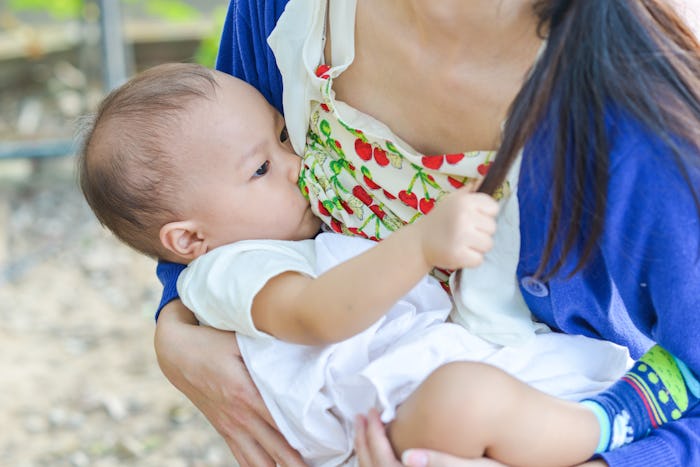Let’s say that you’re having a baby play date with a group of fellow moms when your little one suddenly wants to nurse… like, now. For whatever reason, your letdown is taking a whole lot longer than it should, and your baby is fussing and howling as a result. One of the moms offers to breastfeed your baby for you, but that make you wonder (or worry, or both): What happens if your baby drinks another woman’s breast milk?
Women breastfeeding children other than their own is nothing new. Wet nursing dates back to as early as 2000 BC, a study from the National Institutes of Health reported. And while you can still hire a wet nurse (it can cost you upwards of $1,000 a week, as Today reported), many women who are looking to glean the benefits of breast milk might turn to other nursing mamas to help out. “There are several sources of donor milk including friends, informal nursing groups, internet milk banks and finally donor milk banks,” Juliana Parker, RN, a registered nurse and certified lactation educator, tells Romper.
Now, getting your breast milk from a certified milk bank shouldn’t be too problematic. “Milk that has been obtained through a milk bank is safe because the mothers are screened and tested and the milk is pasteurized and tested,” Andrea Tran RN, BSN, MA, IBCLC, a registered nurse and certified lactation consultant, tells Romper. “They’ll test the donor’s blood for communicable diseases and the milk for bacteria and viruses,” says Parker. “They also pasteurize the milk.” While pasteurization will make the breast milk safer, it can also decrease some of its nutritional value, a second study in the National Institutes of Health found.
But getting your baby’s milk from another gal pal could be equally problematic, too. “Getting milk directly from another mom is risky,” says Tran. “While moms who offer their milk to another mama have good intentions, it is possible to pass diseases through breast milk.” After all, even though it might have more nutrients, the breast milk won’t be pasteurized, so you could be putting your baby at risk for contracting bacteria, diseases, or viruses. “CMV (cytomegalovirus), HIV (human immunodeficiency virus), papillomarvirus, gram-negative and coliform bacteria, stapylococus and E. coli can all be transmitted through breast milk,” says Parker.
Assuming that you’re going to bottlefeed your baby the breast milk (as opposed to letting your little one nurse straight from your friend), there are other issues to contend with. For starters, you’ll need to know the donor mom’s diet. “If she has eaten something that your baby is intolerant to, like dairy, that could be an issue,” says Tran. And you should also find out how the breast milk has been kept for safety purposes. “Proper storage is also a serious consideration,” says Parker. “Did the milk donor place the milk in the freezer immediately, or did it sit in a refrigerator for a period of time? Because breast milk that has been frozen for more than three months loses a considerable amount of nutrients.” Plus, breast milk changes with the age of the baby, so if your friend’s baby is older, the milk might not have as much mojo as it would for, say, a newborn.
If you’re considering using donated breast milk, it’s a good idea to explore all options. Ultimately, it’s up to you to decide where you get the donor milk from to ensure that breast still stays the best (and safest) option for your child.
Studies cited:
Stevens, E., Patrick, T., Picker, R. 2009. “History of Infant Feeding”
https://www.ncbi.nlm.nih.gov/pmc/articles/PMC2684040/
Peila, C., Moro, G., Bertino, E., Cavallarin, L., Giribaldi, M., Giuliani, F., Cresi, F., Coscia, A. 2016. “The Effect of Holder Pasteurization on Nutrients and Biologically-Active Components in Donor Human Milk: A Review”
https://www.ncbi.nlm.nih.gov/pmc/articles/PMC4997390/
Experts:
Juliana Parker, RN, a registered nurse and certified lactation educator
Andrea Tran RN, BSN, MA, IBCLC, a registered nurse and certified lactation consultant
